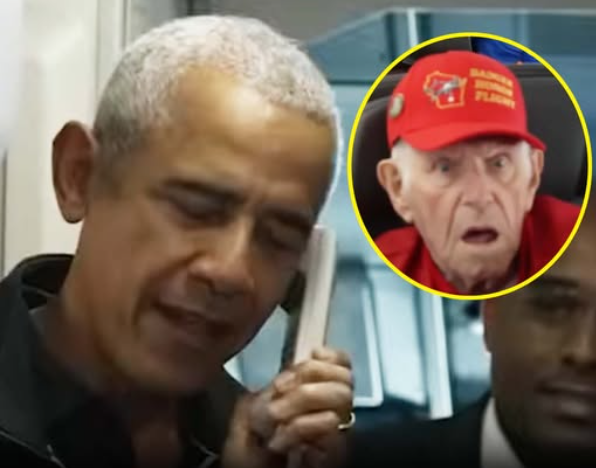Veterans Day has always carried a deep emotional weight, but this year, it struck an even more profound chord for a group of older veterans traveling from Madison, Wisconsin, to Washington, D.C. They were taking part in an Honor Flight — a program that flies veterans to the nation’s capital so they can visit the memorials built in their honor. Most of the veterans on this flight had served long before many Americans alive today were born. They represented the Korean War, the Vietnam War, and decades of service that often went unacknowledged at the time. What none of them expected was that a former President of the United States would be waiting to personally thank them.
When the plane touched down in Washington, the veterans assumed the applause from the cabin crew was the usual warm welcome given on these trips. Then Barack Obama appeared.
There was no entourage, no cameras, no staged theatrics — just Obama in a casual jacket, smiling with genuine gratitude for the moment.
He didn’t call for a press conference or make a formal speech. He walked directly into the cabin, shaking hands, patting shoulders, greeting each veteran individually. The shock on their faces was immediate. Some laughed in disbelief. Others were moved to tears. A few instinctively straightened at the sight of a former Commander-in-Chief, even years after leaving active service.
Then he spoke through the intercom. His voice, familiar to millions, filled the cabin, but the words weren’t meant for cameras or headlines — they were meant for them. He thanked the veterans for all they had given: the time spent on remote bases and in foreign jungles, the friends they had lost, and the quiet years after service when their sacrifices often went unnoticed or misunderstood. He recognized their families as well — spouses who waited, children who grew up with absent parents, the empty chairs at holiday dinners.
“These are the people who protected our nation before many of us even knew what sacrifice meant,” he said. “Your service is honored. Your families’ sacrifices are honored. And we are grateful — today and every day.”
Some veterans wiped their eyes; others stared ahead, stoic and unflinching, having witnessed more than most people ever will. Some broke into broad smiles. Regardless of how they reacted, the moment landed fully on each of them.
The Honor Flight program itself is remarkable. For over two decades, it has flown veterans to Washington at no cost, allowing them to stand before memorials built to honor their service. Over 300,000 veterans have participated, many finally receiving the gratitude they never experienced when returning home.
For the Korean War veterans on this trip, often called “the forgotten war,” proper acknowledgment had been rare. For the Vietnam veterans, returning home was fraught with hostility and misunderstanding. This flight was more than a trip — it was an overdue recognition, a long-awaited gesture of closure.
Obama’s presence wasn’t a celebrity appearance. It was a symbolic acknowledgment — a nation, through him, giving veterans the respect they deserved decades ago.
After the initial welcome, the veterans moved through the airport, greeted by more applause, flag-waving, and handshakes. They were escorted to buses heading to the Vietnam Veterans Memorial, the Korean War Veterans Memorial, the Lincoln Memorial, and Arlington National Cemetery. Obama didn’t join the full tour, but before leaving, he personally handed each veteran a Presidential Challenge Coin — a traditional symbol of honor, exchanged for exceptional service.
For these veterans, the coins weren’t just keepsakes. They were direct, meaningful recognition.
Later that evening, Obama reflected on the encounter in a post on Medium. He didn’t boast or inflate the moment; instead, he focused on their stories, resilience, and quiet dignity. He emphasized the importance of expressing gratitude while the veterans are still here to hear it.
And that was the part that stood out: the moment was theirs, not his.
The story spread quickly, not because of politics or media spectacle, but because genuine human respect resonates universally. These veterans had once flown off to war, and now, in their later years, they were flying to be honored. The personal acknowledgment of a former president wasn’t required, wasn’t expected — but it mattered profoundly.
For many on that flight, this could be their final Honor Flight. Their bodies were older, memories sometimes blurred, stories fading unless someone listened. That’s why the flights exist: to ensure their service is remembered, to allow them to see memorials built in their honor, and to give the nation one more chance to show appreciation.
The presence of a former president, personally thanking them and giving them a challenge coin, added a dignity that will stay with them for life.
Veterans Day can feel ceremonial or symbolic, but for those on this flight, it became personal, tangible. A reminder that service matters, that gratitude matters, and that showing up — even when you don’t have to — is often the most meaningful gesture of all.
Ultimately, this story isn’t about politics. It’s about respect. About honoring those who gave their youth, strength, and parts of their lives so others could live in peace. Obama didn’t erase their pain or rewrite history, but he offered something simple yet profound: recognition.
For the veterans who waited decades for such a moment, it meant everything.
